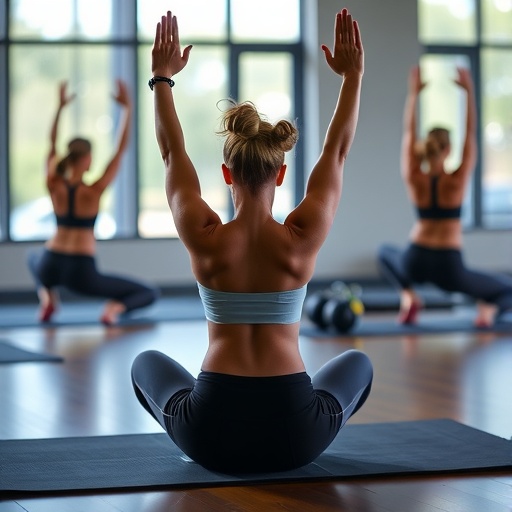In a groundbreaking study published in BMC Psychiatry, researchers have unveiled compelling evidence that Pilates exercise can profoundly enhance both the physical and mental well-being of drug-dependent individuals. This randomized controlled trial pioneers a new direction in drug rehabilitation strategies, highlighting the significance of integrating targeted exercise interventions into conventional treatment paradigms. The investigation meticulously explored how a structured Pilates regimen over 24 weeks can catalyze improvements in body composition, cardiovascular and immune function, muscle performance, balance, as well as alleviate symptoms of anxiety and depression.
The motivation behind this inquiry stems from the recognized complexity of addiction recovery, where substance dependence often precipitates severe and multifaceted physical and psychological health challenges. Traditional rehabilitation programs primarily focus on abstinence and psychological counseling, frequently overlooking the tangible benefits of physical exercise in holistic recovery frameworks. Against this backdrop, Pilates—a low-impact, adaptable form of physical exercise emphasizing flexibility, strength, controlled movement, and mindfulness—emerged as a promising candidate for intervention.
Conducted as a rigorously controlled, double-blind, parallel-group trial, the study enrolled 43 participants from the Judong Drug Rehabilitation Center. These individuals, all substance-dependent, were randomly assigned either to a twice-weekly Pilates program or to continue with the center’s conventional rehabilitation routines. The Pilates group engaged in sessions designed to progressively improve core strength, aerobic capacity, joint flexibility, and balance, all crucial components often diminished by prolonged drug use and sedentary lifestyles.
Throughout the trial, researchers employed comprehensive assessments at baseline, midpoint (12 weeks), and conclusion (24 weeks). Physical metrics included body fat percentage, skeletal muscle mass, flexibility measured by sit-and-reach distance, muscular endurance via push-up counts, balance evaluated through one-leg standing tests with eyes closed, and lung function quantified by vital capacity. These tests were coupled with blood analyses focusing on immune markers such as white blood cell counts and neutrophil levels.
The mental health dimensions were gauged through validated scales for depression and anxiety, specifically the Self-Rating Depression Scale (SDS) and Self-Rating Anxiety Scale (SAS). These tools provided quantitative indicators of psychological symptom severity, enabling nuanced correlation analyses between physical ameliorations and mental health trajectories across the intervention period.
Results were striking. After 24 weeks, the Pilates cohort exhibited significant reductions in body fat alongside notable increases in skeletal muscle mass, reflecting a marked shift toward healthier body composition. Enhanced flexibility was apparent from improved sit-and-reach scores, while muscular endurance gains were evidenced by greater push-up performance. Importantly, balance improvements, as shown by longer one-leg standing duration with eyes closed, underscored gains in neuromotor control and proprioception, factors instrumental in injury prevention and functional autonomy.
Pulmonary function improvements were also significant, as vital capacity increased in the intervention group, indicating enhanced respiratory efficiency—an often neglected but vital area of recovery in substance use disorders, where lung health can be compromised. Blood biochemistry analysis revealed elevated white blood cell and neutrophil counts, suggesting bolstered immune system responsiveness, positioning Pilates as not only a tool for physical rehabilitation but also for fortifying systemic resilience.
Psychologically, participants engaging in Pilates demonstrated a substantive decrease in anxiety and depression scores compared to controls. The robust statistical differences exhibited high significance, underlining Pilates’ therapeutic potential in mitigating the often-debilitating internal distress that accompanies addiction recovery. Correlation analyses further illuminated intricate relationships: improvements in depression scores were inversely correlated with gains in flexibility, balance, and lung capacity, implying that enhancements in these physical domains paralleled better mental health outcomes.
Similarly, reductions in anxiety correlated negatively with inflammatory indices such as neutrophil-to-lymphocyte and platelet-to-lymphocyte ratios, alongside physical fitness markers. This finding alludes to the complex bidirectional interplay between systemic inflammation and psychological states, and suggests that Pilates may modulate neuroimmune pathways integral to mental health stabilization.
This study stands at the forefront of integrative rehabilitation research, proposing that tailored exercise regimens, mindful of participant health metrics and functional capacity, can transform the recovery landscape for substance-dependent populations. The holistic benefits unearthed—spanning body, mind, and immune function—advocate for incorporating scientifically validated physical training into standard drug rehabilitation protocols.
Moreover, the convenience, adaptability, and low injury risk of Pilates make it an especially attractive modality for this vulnerable group, who often contend with chronic health complications and motivation challenges. These attributes strengthen the case for widespread Pilates program adoption in diverse treatment settings, potentially extending benefits to outpatient or community-based recovery environments.
In a broader context, the trial contributes critical data addressing the mechanistic underpinnings of exercise-induced mental health improvements in addiction. The inverse correlations between physical function enhancements and mood parameters may reflect neuroplastic adaptations, stress system recalibration, and inflammation reduction—all areas ripe for further exploration. This opens avenues for future multi-modal interventions combining physical activity with pharmacotherapy and psychotherapy.
While the sample size was modest, the study’s meticulous design and comprehensive measurement approach impart strong internal validity. The double-blind methodology, often challenging in exercise studies, offered rigorous controls to isolate Pilates’ effects, setting a new standard for future trials in this field. Researchers recommend larger-scale studies with diverse populations and longer follow-up durations to confirm and extend these promising findings.
In sum, the compelling evidence emerging from this controlled Pilates intervention offers a beacon of hope within addiction recovery, positioning physical exercise as a pivotal ally in the quest to restore holistic health. It underscores the necessity of moving beyond traditional singular approaches toward fully integrated, body-mind strategies that empower individuals on their journey to sustained recovery and well-being.
Subject of Research: Effects of Pilates exercise on physical and mental health outcomes in drug-dependent individuals.
Article Title: Effect of pilates on the physical and mental health of drug-dependent individuals — a randomized controlled trial
Article References:
Ji, F., Zhou, E., Zhao, P. et al. Effect of pilates on the physical and mental health of drug-dependent individuals — a randomized controlled trial. BMC Psychiatry 25, 559 (2025). https://doi.org/10.1186/s12888-025-07008-7
Image Credits: AI Generated




